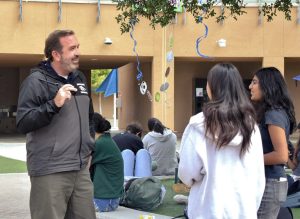Flaws with the IUSD standardized high school bell schedule
STRESSED OUT: Students and teachers may be up for a rough ride with next year’s schedule.
April 23, 2021
As we transition out of the pandemic, our return to normalcy will not be as straightforward in regards to next year’s bell schedule. For students, going from the current hybrid schedule to a revised, fully in-person schedule may be difficult and potentially detrimental to productivity, especially due to the implementation of an undesirable all-periods day every Monday, known as an “anchor day.”
In addition to the all-periods day beginning at 9 a.m. on Mondays, next year’s schedule has quite a few changes. The start of the school day has been gracefully moved to 8:30 a.m. for the rest of the week to bring IUSD into early compliance with a state regulation that goes into effect in 2022, and each school day ends at the same time, which will be later than we are used to.
Tuesday through Friday will follow our customary alternating block schedule with a 30-minute tutorial after the day’s first period. Each class will be 85 minutes (five minutes less than our former schedule), break will be five minutes (also five minutes less than before) and lunch will be 35 minutes. Though doubts have been raised by teachers across campus, the current plan is to abide by this schedule only for next year and revert back to each school’s regular schedule afterwards.
It’s true that a change in our routine can teach us valuable lessons. Period scheduling has its upsides—though few—as attending a class one more day in the week may help students retain the material. As for teachers, the scarcity of time may impel more efficient lesson plans and a reduction of extraneous discussions.
These benefits, however, are miniscule in comparison to its downsides, as constantly switching between classes prompts unproductivity, disorganization and a lack of individualized attention for students. Cramming six classes into less than six hours forces students to constantly readjust their focus and not be able to engage in in-depth reflection. Students could also receive additional homework from every class: a workload that would become overwhelming in the long run.
Despite these factors, an all-periods day looks to be unavoidable, for driving these schedule changes is the need to accommodate for next year’s Irvine Virtual Academy (IVA) schedule. Due to the uncertainties around COVID-19 next school year, attending in-person, IVA or a blended approach remain options for students. For blended learning, although there will be logistical challenges, students will be able to take courses at Northwood in addition to electives unique to IVA, or vice versa. Consequently, IUSD administrators require a schedule consistent for all high schools in order to ease transitions for students and teachers involved in both their home school and IVA classes.
Thus, with increasing pressure on the legal requirements concerning instruction time in schools, a representative democracy of staff across the district convened to design a schedule. With most schools dedicating certain days or none at all to a block schedule, Northwood’s all-block-schedule stance stands as a minority voice in this consequential decision. Meanwhile, student input seems to have not been considered at all.
“There’s a committee of three people from every high school, principals, and people from the district office that had to come to a consensus on next year’s schedule,” Northwood Principal Leslie Roach said. “There was more support district-wide for the anchor day on Monday than for the alternating block schedule.”
Yet the district-wide schedule brought on by IVA inconveniences everyone, as for example, University High School previously followed the traditional period scheduling and would now need to follow a block schedule.
At this point, there’s likely no way around it, and we’re faced with the question: What are we supposed to do on Mondays?
“The science department enjoys longer blocks of time for extended activities and labs. We’re not used to a shortened period,” IS2 and AP Physics teacher Karen Zhou said. “We may use Mondays for introductory activities, review and shorter direct instruction. In any case, our plans for lessons will have to change.”
Teachers from the history department have considered using Monday as an unstructured day for independent study, review and tests while math teachers are considering holding homework review and quizzes. From a teacher perspective, administering assessments for all students to take on the same day would be ideal to curb academic dishonesty.
However, tests in multiple classes on Mondays may accumulate into overwhelming stress for students and a transformation of the weekend into simply a preparation session for assessments. Fortunately, those tests will likely not be major given the 40-minute class period. In fact, most activities cannot take place during that time, even more so after accounting for the time to get settled, take attendance and introduce the lesson.
“I believe Northwood has kept an alternating block schedule for a long time for good reasons,” junior Miya Liu said. “I’m doubtful about how we can make use of such a small amount of time, and as a student, I’m not sure if I will find coming to school on Monday meaningful if there’s not much we can do.”
Ultimately, an all-periods day is not ideal for students and teachers alike at Northwood, but it’s a compromise we have to make. The many changes that have come with this year have all pushed us to both settle and innovate, and moving into next year, Northwood will continue to rise above the occasion.



![AAAAAND ANOTHER THING: [CENSORED] [REDACTED] [BABY SCREAMING] [SIRENS] [SILENCE].](https://thehowleronline.org/wp-content/uploads/2025/06/lucy-1200x800.jpg)






















































